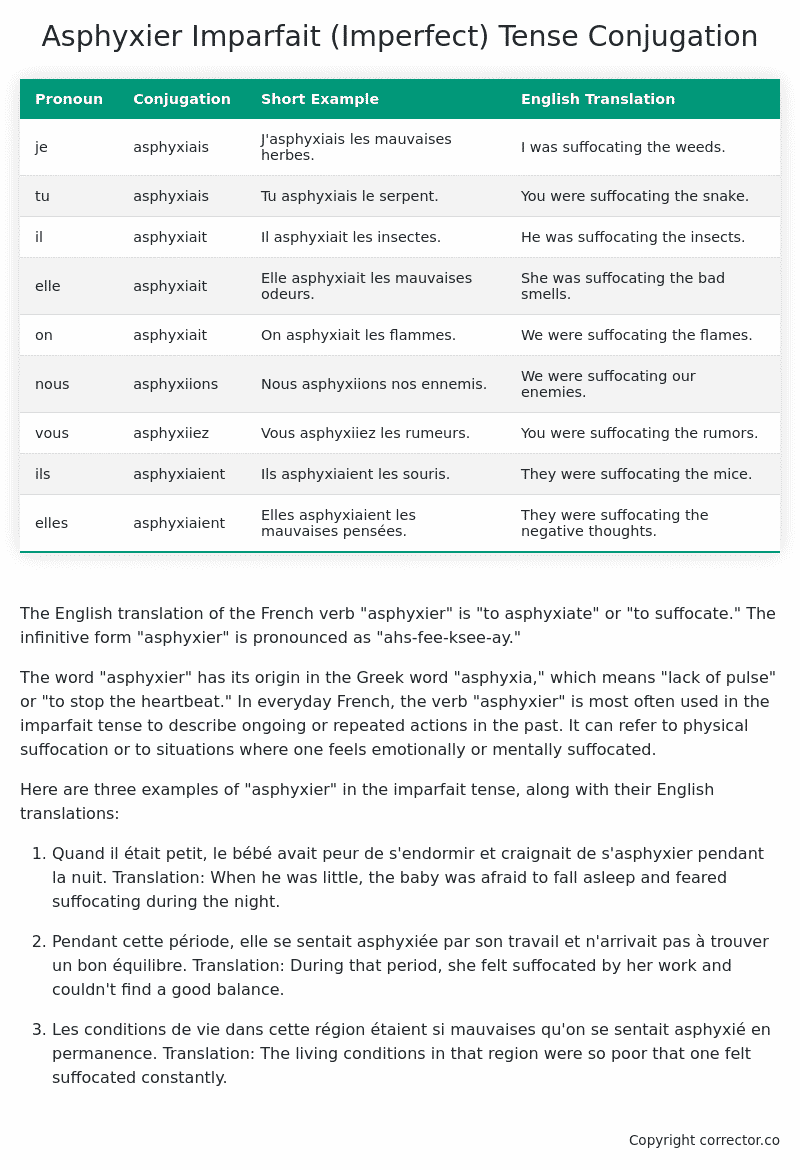Imparfait (Imperfect) Tense Conjugation of the French Verb asphyxier
Introduction to the verb asphyxier
The English translation of the French verb “asphyxier” is “to asphyxiate” or “to suffocate.” The infinitive form “asphyxier” is pronounced as “ahs-fee-ksee-ay.”
The word “asphyxier” has its origin in the Greek word “asphyxia,” which means “lack of pulse” or “to stop the heartbeat.” In everyday French, the verb “asphyxier” is most often used in the imparfait tense to describe ongoing or repeated actions in the past. It can refer to physical suffocation or to situations where one feels emotionally or mentally suffocated.
Here are three examples of “asphyxier” in the imparfait tense, along with their English translations:
-
Quand il était petit, le bébé avait peur de s’endormir et craignait de s’asphyxier pendant la nuit.
Translation: When he was little, the baby was afraid to fall asleep and feared suffocating during the night. -
Pendant cette période, elle se sentait asphyxiée par son travail et n’arrivait pas à trouver un bon équilibre.
Translation: During that period, she felt suffocated by her work and couldn’t find a good balance. -
Les conditions de vie dans cette région étaient si mauvaises qu’on se sentait asphyxié en permanence.
Translation: The living conditions in that region were so poor that one felt suffocated constantly.
Table of the Imparfait (Imperfect) Tense Conjugation of asphyxier
| Pronoun | Conjugation | Short Example | English Translation |
|---|---|---|---|
| je | asphyxiais | J’asphyxiais les mauvaises herbes. | I was suffocating the weeds. |
| tu | asphyxiais | Tu asphyxiais le serpent. | You were suffocating the snake. |
| il | asphyxiait | Il asphyxiait les insectes. | He was suffocating the insects. |
| elle | asphyxiait | Elle asphyxiait les mauvaises odeurs. | She was suffocating the bad smells. |
| on | asphyxiait | On asphyxiait les flammes. | We were suffocating the flames. |
| nous | asphyxiions | Nous asphyxiions nos ennemis. | We were suffocating our enemies. |
| vous | asphyxiiez | Vous asphyxiiez les rumeurs. | You were suffocating the rumors. |
| ils | asphyxiaient | Ils asphyxiaient les souris. | They were suffocating the mice. |
| elles | asphyxiaient | Elles asphyxiaient les mauvaises pensées. | They were suffocating the negative thoughts. |
Other Conjugations for Asphyxier.
Le Present (Present Tense) Conjugation of the French Verb asphyxier
Imparfait (Imperfect) Tense Conjugation of the French Verb asphyxier (You’re reading it right now!)
Passé Simple (Simple Past) Tense Conjugation of the French Verb asphyxier
Passé Composé (Present Perfect) Tense Conjugation of the French Verb asphyxier
Futur Simple (Simple Future) Tense Conjugation of the French Verb asphyxier
Futur Proche (Near Future) Tense Conjugation of the French Verb asphyxier
Plus-que-parfait (Pluperfect) Tense Conjugation of the French Verb asphyxier
Passé Antérieur (Past Anterior) Tense Conjugation of the French Verb asphyxier
Futur Antérieur (Future Anterior) Tense Conjugation of the French Verb asphyxier
Subjonctif Présent (Subjunctive Present) Tense Conjugation of the French Verb asphyxier
Subjonctif Passé (Subjunctive Past) Tense Conjugation of the French Verb asphyxier
Subjonctif Imparfait (Subjunctive Imperfect) Tense Conjugation of the French Verb asphyxier
Subjonctif Plus-que-parfait (Subjunctive Pluperfect) Tense Conjugation of the French Verb asphyxier
Conditionnel Présent (Conditional Present) Tense Conjugation of the French Verb asphyxier
Conditionnel Passé (Conditional Past) Tense Conjugation of the French Verb asphyxier
Conditionnel Passé II (Conditional Past II) Tense Conjugation of the French Verb asphyxier
L’impératif Présent (Imperative Present) Tense Conjugation of the French Verb asphyxier
L’impératif Passé (Imperative Past) Tense Conjugation of the French Verb asphyxier
L’infinitif Présent (Infinitive Present) Tense Conjugation of the French Verb asphyxier
L’infinitif Passé (Infinitive Past) Tense Conjugation of the French Verb asphyxier
Le Participe Présent (Present Participle) Tense Conjugation of the French Verb asphyxier
Le Participe Passé (Past Participle) Tense Conjugation of the French Verb asphyxier
Struggling with French verbs or the language in general? Why not use our free French Grammar Checker – no registration required!
Get a FREE Download Study Sheet of this Conjugation 🔥
Simply right click the image below, click “save image” and get your free reference for the asphyxier imparfait tense conjugation!

Asphyxier – About the French Imparfait Tense
NOTE: To take a deep dive into all the French tenses then see our article on Mastering French Tense Conjugation.
Formation of the Imparfait Tense
For regular -er verbs:
For regular -ir verbs
For regular -re verbs
Common Everyday Usage Patterns
Description of Past Habits
Background Information
Mental and Emotional States
It’s employed to express emotions, thoughts, or physical sensations in the past. For example: “J’étais content quand il est arrivé.” (I was happy when he arrived.)
Ongoing Actions
Points to Note About the Imparfait Tense
Passé Composé vs. Imparfait
Conditional
Si Clauses
Narration
I hope you enjoyed this article on the verb asphyxier. Still in a learning mood? Check out another TOTALLY random French verb imparfait conjugation!


